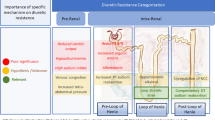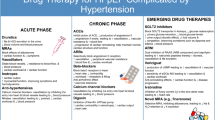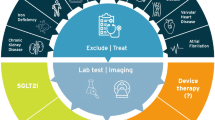Abstract
Background
Heart Failure continues to be a leading cause of mortality and morbidity worldwide. The dismal prognosis of patients in acute heart failure (AHF) can be altered only by exploring novel drug molecules. Although the treatment for chronic heart failure (CHF) has seen remarkable progress, there is still a need to develop molecules that could improve the long-term survival outcomes.
Purpose
To review the drug targets for acute and chronic heart failure and the molecules acting on these targets.
Methods
The article discusses on the mechanism of how the potential drug targets can be modulated to alter the pathophysiological processes in heart failure. Current evidence on molecules acting on these targets has also been described from published literature using the PubMed and Clinical Trials.gov databases.
Results
Some of the molecules that are currently being explored for AHF includeomecamtiv mecarbil which activates cardiac myosin ATPase, istaroxime an ionotropicagent that activates SERCA2a pump activity, ularitide and carperitide which are ANP(atrial natriuretic peptide) analogues and recombinant relaxin. Some of the targets forCHF include stabilization of ryanodine receptors, renin inhibition, neprilysin inhibition, neuregulins and SERCA2a gene therapy.
Conclusion
Clinical trials in heart failure must be designed to minimize the risk of “drug failures.” Nevertheless, it is hoped that in the days to come, drugs with superior efficacy and safety will eventually be produced from the surge of molecules that are in the pipeline.



Similar content being viewed by others
References
Heart Failure . http://www.clevelandclinicmeded.com/medicalpubs/diseasemanagement/cardiology/heart-failure/.Accessed 16 Sep 2013
Bui AL, Horwich TB, Fonarow GC (2011) Epidemiology and risk profile of heart failure. Nat Rev Cardiol 8:30–41
WRITING GROUP MEMBERS, Lloyd-Jones D, Adams RJ, Brown TM et al (2010) Heart disease and stroke statistics—2010 update: a report from the American Heart Association. Circulation 121:e46–e215
Nieminen MS, Brutsaert D, Dickstein K et al (2006) EuroHeart Failure Survey II (EHFS II): a survey on hospitalized acute heart failure patients: description of population. Eur Heart J 27:2725–2736
Norton C, Georgiopoulou VV, Kalogeropoulos AP, Butler J (2011) Epidemiology and cost of advanced heart failure. Prog Cardiovasc Dis 54:78–85
Ferrandi M, Barassi P, Tadini-Buoninsegni F et al (2013) Istaroxime stimulates SERCA2a and accelerates calcium cycling in heart failure by relieving phospholamban inhibition. Br J Pharmacol 169:1849–1861
Micheletti R, Mattera GG, Rocchetti M et al (2002) Pharmacological profile of the novel inotropic agent (E, Z)-3-((2-aminoethoxy)imino)androstane-6,17-dione hydrochloride (PST2744). J Pharmacol Exp Ther 303:592–600
Khan H, Metra M, Blair JEA et al (2009) Istaroxime, a first in class new chemical entity exhibiting SERCA-2 activation and Na-K-ATPase inhibition: a new promising treatment for acute heart failure syndromes? Heart Fail Rev 14:277–287
Blair JEA, Macarie C, Ruzyllo W et al (2008) Rationale and design of the hemodynamic, echocardiographic and neurohormonal effects of istaroxime, a novel intravenous inotropic and lusitropic agent: a randomized controlled trial in patients hospitalized with heart failure (HORIZON-HF) trial. Am J Ther 15:231–240
Shah SJ, Blair JEA, Filippatos GS et al (2009) Effects of istaroxime on diastolic stiffness in acute heart failure syndromes: results from the Hemodynamic, Echocardiographic, and Neurohormonal Effects of Istaroxime, a Novel Intravenous Inotropic and Lusitropic Agent: a Randomized Controlled Trial in Patients Hospitalized with Heart Failure (HORIZON-HF) trial. Am Heart J 157:1035–1041
Aditya S, Rattan A (2012) Istaroxime: A rising star in acute heart failure. J Pharmacol Pharmacother 3:353–355
Garg V, Frishman WH (2013) A new approach to inotropic therapy in the treatment of heart failure: cardiac myosin activators in treatment of HF. Cardiol Rev 21:155–159
Malik FI, Morgan BP (2011) Cardiac myosin activation part 1: from concept to clinic. J Mol Cell Cardiol 51:454–461
Meijs MFL, Asselbergs FW, Doevendans PA (2012) Omecamtiv mecarbil: a promising new drug in systolic heart failure. Eur J Heart Fail 14:232–233
Teerlink JR, Clarke CP, Saikali KG et al (2011) Dose-dependent augmentation of cardiac systolic function with the selective cardiac myosin activator, omecamtiv mecarbil: a first-in-man study. Lancet 378:667–675
Cleland JGF, Teerlink JR, Senior R et al (2011) The effects of the cardiac myosin activator, omecamtiv mecarbil, on cardiac function in systolic heart failure: a double-blind, placebo-controlled, crossover, dose-ranging phase 2 trial. Lancet 378:676–683
Avanzas P, Bayes-Genis A, de Isla LP, Sanchis J, Heras M (2013) Summary of the Clinical Studies Reported in the European Society of Cardiology Congress 2013 (31 August – 4 September, 2013, Amsterdam, The Netherlands). Rev Esp Cardiol Engl Ed 66:879.e1–879.e9
Clinical Trials.gov http://clinicaltrials.gov/ct2/show/NCT01786512?term=omecamtiv+mecarbil&rank=4.Accessed 17 March 2014
Cernaro V, Lacquaniti A, Lupica R, et al (2013) Relaxin: New Pathophysiological Aspects and Pharmacological Perspectives for an Old Protein. Med Res Rev
Teichman SL, Unemori E, Teerlink JR, Cotter G, Metra M (2010) Relaxin: review of biology and potential role in treating heart failure. Curr Heart Fail Rep 7:75–82
Teerlink JR, Metra M, Felker GM et al (2009) Relaxin for the treatment of patients with acute heart failure (Pre-RELAX-AHF): a multicentre, randomised, placebo-controlled, parallel-group, dose-finding phase IIb study. Lancet 373:1429–1439
Metra M, Cotter G, Davison BA et al (2013) Effect of serelaxin on cardiac, renal, and hepatic biomarkers in the Relaxin in Acute Heart Failure (RELAX-AHF) development program: correlation with outcomes. J Am Coll Cardiol 61:196–206
Novartis to request re-examination of serelaxin (RLX030) in acute heart failure (AHF) for conditional marketing authorization in EU. http://www.novartis.com/newsroom/media-releases/en/2014/1756879.shtml. Accessed 17 March 2014
Edwards BS, Zimmerman RS, Schwab TR, Heublein DM, Burnett JC Jr (1988) Atrial stretch, not pressure, is the principal determinant controlling the acute release of atrial natriuretic factor. Circ Res 62:191–195
Saito Y (2010) Roles of atrial natriuretic peptide and its therapeutic use. J Cardiol 56:262–270
Ishikawa C, Tsutamoto T, Wada A et al (2005) Inhibition of aldosterone and endothelin-1 by carperitide was attenuated with more than 1 week of infusion in patients with congestive heart failure. J Cardiovasc Pharmacol 46:513–518
Hayashi M, Tsutamoto T, Wada A et al (2001) Intravenous atrial natriuretic peptide prevents left ventricular remodeling in patients with first anterior acute myocardial infarction. J Am Coll Cardiol 37:1820–1826
Shono M, Yoshimura M, Nakayama M et al (2007) Predominant effect of A-type natriuretic peptide on reduction of oxidative stress during the treatment of patients with heart failure. Circ J Off J Jpn Circ Soc 71:1040–1046
Liang F, O’Rear J, Schellenberger U et al (2007) Evidence for functional heterogeneity of circulating B-type natriuretic peptide. J Am Coll Cardiol 49:1071–1078
Chen HH, Glockner JF, Schirger JA, Cataliotti A, Redfield MM, Burnett JC Jr (2012) Novel protein therapeutics for systolic heart failure: chronic subcutaneous B-type natriuretic peptide. J Am Coll Cardiol 60:2305–2312
Suwa M, Seino Y, Nomachi Y, Matsuki S, Funahashi K (2005) Multicenter prospective investigation on efficacy and safety of carperitide for acute heart failure in the “real world” of therapy. Circ J Off J Jpn Circ Soc 69:283–290
Nomura F, Kurobe N, Mori Y et al (2008) Multicenter prospective investigation on efficacy and safety of carperitide as a first-line drug for acute heart failure syndrome with preserved blood pressure: COMPASS: Carperitide Effects Observed Through Monitoring Dyspnea in Acute Decompensated Heart Failure Study. Circ J Off J Jpn Circ Soc 72:1777–1786
Hata N, Seino Y, Tsutamoto T et al (2008) Effects of carperitide on the long-term prognosis of patients with acute decompensated chronic heart failure: the PROTECT multicenter randomized controlled study. Circ J Off J Jpn Circ Soc 72:1787–1793
Sezai A, Hata M, Niino T et al (2010) Continuous low-dose infusion of human atrial natriuretic peptide in patients with left ventricular dysfunction undergoing coronary artery bypass grafting: the NU-HIT (Nihon University working group study of low-dose Human ANP Infusion Therapy during cardiac surgery) for left ventricular dysfunction. J Am Coll Cardiol 55:1844–1851
Selby VN, Teerlink JR (2013) What’s new in the treatment of acute heart failure? Curr Cardiol Rep 15:393
Mitrovic V, Seferovic PM, Simeunovic D et al (2006) Haemodynamic and clinical effects of ularitide in decompensated heart failure. Eur Heart J 27:2823–2832
Lüss H, Mitrovic V, Seferovic PM et al (2008) Renal effects of ularitide in patients with decompensated heart failure. Am Heart J 155:1012.e1–8
Efficacy and Safety of Ularitide for the Treatment of Acute Decompensated Heart Failure - Full Text View - ClinicalTrials.gov.http://www.clinicaltrials.gov/ct2/show/NCT01661634?term=TRUE+AHF&rank=1.Accessed 24 Sep 2013
Kushnir A, Marks AR (2010) The ryanodine receptor in cardiac physiology and disease. Adv Pharmacol San Diego Calif 59:1–30
Aronson D, Krum H (2012) Novel therapies in acute and chronic heart failure. Pharmacol Ther 135:1–17
Shan J, Betzenhauser MJ, Kushnir A et al (2010) Role of chronic ryanodine receptor phosphorylation in heart failure and β-adrenergic receptor blockade in mice. J Clin Invest 120:4375–4387
Sacherer M, Sedej S, Wakuła P et al (2012) JTV519 (K201) reduces sarcoplasmic reticulum Ca2+ leak and improves diastolic function in vitro in murine and human non-failing myocardium. Br J Pharmacol 167:493–504
Lehnart SE, Mongillo M, Bellinger A et al (2008) Leaky Ca2+ release channel/ryanodine receptor 2 causes seizures and sudden cardiac death in mice. J Clin Invest 118:2230–2245
http://www.controlled-trials.com/ISRCTN14227980. Accessed 17 March 2014
Sawyer DB, Caggiano A (2011) Neuregulin-1β for the treatment of systolic heart failure. J Mol Cell Cardiol 51:501–505
Zhao YY, Sawyer DR, Baliga RR et al (1998) Neuregulins promote survival and growth of cardiac myocytes. Persistence of ErbB2 and ErbB4 expression in neonatal and adult ventricular myocytes. J Biol Chem 273:10261–10269
Li B, Zheng Z, Wei Y et al (2011) Therapeutic effects of neuregulin-1 in diabetic cardiomyopathy rats. Cardiovasc Diabetol 10:69
Liu X, Gu X, Li Z et al (2006) Neuregulin-1/erbB-activation improves cardiac function and survival in models of ischemic, dilated, and viral cardiomyopathy. J Am Coll Cardiol 48:1438–1447
Jabbour A, Hayward CS, Keogh AM et al (2011) Parenteral administration of recombinant human neuregulin-1 to patients with stable chronic heart failure produces favourable acute and chronic haemodynamic responses. Eur J Heart Fail 13:83–92
Gao R, Zhang J, Cheng L et al (2010) A Phase II, randomized, double-blind, multicenter, based on standard therapy, placebo-controlled study of the efficacy and safety of recombinant human neuregulin-1 in patients with chronic heart failure. J Am Coll Cardiol 55:1907–1914
Valluri A, Struthers AD, Lang CC (2013) Novel Blockers of the Renin-Angiotensin-Aldosterone System in Chronic Heart Failure. Curr Heart Fail Rep(Nov 15)
McMurray JJV, Pitt B, Latini R, Maggioni AP et al (2008) Effects of the oral direct renin inhibitor aliskiren in patients with symptomatic heart failure. Circ Heart Fail 1:17–24
Solomon SD, Shin SH, Shah A et al (2011) Effect of the direct renin inhibitor aliskiren on left ventricular remodelling following myocardial infarction with systolic dysfunction. Eur Heart J 32:1227–1234
Gheorghiade M, Böhm M, Greene SJ et al (2013) Effect of aliskiren on postdischarge mortality and heart failure readmissions among patients hospitalized for heart failure: the ASTRONAUT randomized trial. JAMA J Am Med Assoc 309:1125–1135
Efficacy and Safety of Aliskiren and Aliskiren/Enalapril Combination on Morbi-mortality in Patients With Chronic Heart Failure - Full Text View - ClinicalTrials.gov. http://clinicaltrials.gov/ct2/show/NCT00853658?term=aliskiren+AND+heart+failure&rank=2. Accessed 17 Mar 2014
Abstract 19378: First Experience with Concomitant AT1 and Neprilysin (NEP 24.11) Inhibition with LCZ696 in Patients with Chronic Heart Failure -- Kobalava et al. 122 (10021): A19378 -- Circulation . http://circ.ahajournals.org/cgi/content/meeting_abstract/122/21_MeetingAbstracts/A19378.Accessed 14 March 2014
Solomon SD, Zile M, Pieske B et al (2012) The angiotensin receptor neprilysin inhibitor LCZ696 in heart failure with preserved ejection fraction: a phase 2 double-blind randomised controlled trial. Lancet 380:1387–1395
McMurray JJV, Packer M, Desai AS et al (2013) Dual angiotensin receptor and neprilysin inhibition as an alternative to angiotensin-converting enzyme inhibition in patients with chronic systolic heart failure: rationale for and design of the Prospective comparison of ARNI with ACEI to Determine Impact on Global Mortality and morbidity in Heart Failure trial (PARADIGM-HF). Eur J Heart Fail 15:1062–1073
Ather S, Respress JL, Li N, Wehrens XHT (2013) Alterations in ryanodine receptors and related proteins in heart failure.Biochim Biophys Acta
Bers DM (2008) Calcium cycling and signaling in cardiac myocytes. Annu Rev Physiol 70:23–49
Jessup M, Greenberg B, Mancini D et al (2011) Calcium Upregulation by Percutaneous Administration of Gene Therapy in Cardiac Disease (CUPID): a phase 2 trial of intracoronary gene therapy of sarcoplasmic reticulum Ca2 + −ATPase in patients with advanced heart failure. Circulation 124:304–313
Zsebo K, Yaroshinsky A, Rudy JJ et al (2014) Long-term effects of AAV1/SERCA2a gene transfer in patients with severe heart failure: analysis of recurrent cardiovascular events and mortality. Circ Res 114:101–108
A Study of Genetically Targeted Enzyme Replacement Therapy for Advanced Heart Failure - Full Text View - ClinicalTrials.gov .http://www.clinicaltrials.gov/ct2/show/study/NCT01643330?term=CUPID+study&rank=4&show_locs=Y#locn. Accessed 17 Mar 2014.
Niederseer D, Thaler CW, Niederseer M, Niebauer J (2013) Mismatch between heart failure patients in clinical trials and the real world. Int J Cardiol
Van Spall HGC, Toren A, Kiss A, Fowler RA (2007) Eligibility criteria of randomized controlled trials published in high-impact general medical journals: a systematic sampling review. JAMA J Am Med Assoc 297:1233–1240
Collins SP, Levy PD, Lindsell CJ et al (2009) The rationale for an acute heart failure syndromes clinical trials network. J Card Fail 15:467–474
McDonagh TA, Komajda M, Maggioni AP et al (2009) Clinical trials in acute heart failure: simpler solutions to complex problems. Consensus document arising from a European Society of Cardiology cardiovascular round-table think tank on acute heart failure. Eur J Heart Fail 13:1253–1260
Search of: istaroxime - List Results - ClinicalTrials.gov. http://www.clinicaltrials.gov/ct2/results/displayOpt?flds=a&flds=b&flds=f&submit_fld_opt=on&term=istaroxime&show_flds=Y. Accessed 19 Sep 2013
Search of: omecamtiv mecarbil - List Results - ClinicalTrials.gov .http://www.clinicaltrials.gov/ct2/results?term=omecamtiv+mecarbil&Search=Search. Accessed 19 Sep 2013
Search of: carperitide - List Results - ClinicalTrials.gov . http://www.clinicaltrials.gov/ct2/results?term=carperitide&Search=Search. Accessed 19 Sep 2013
Search of: relaxin - List Results - ClinicalTrials.gov .http://www.clinicaltrials.gov/ct2/results?term=relaxin&Search=Search. Accessed 19 Sep 2013
Search of: cinaciguat - List Results - ClinicalTrials.gov .http://www.clinicaltrials.gov/ct2/results?term=cinaciguat&Search=Search. Accessed 19 Sep 2013
Search of: SERCA2a - List Results - ClinicalTrials.gov .http://www.clinicaltrials.gov/ct2/results?term=SERCA2a&Search=Search. Accessed 19 Sep 2013
Cooper TJ, Guazzi M, Al-Mohammad A et al (2013) Sildenafil in Heart Failure (SilHF). An investigator-initiated multinational randomized controlled clinical trial: rationale and design. Eur J Heart Fail 15:119–122
Mylona P, Cleland JG (1999) Update of REACH-1 and MERIT-HF clinical trials in heart failure. Cardio.net Editorial Team. Eur J Heart Fail 1:197–200
Handoko ML, de Man FS, Vonk-Noordegraaf A (2011) The rise and fall of endothelin receptor antagonists in congestive heart failure. Eur Respir J 37:484–485
Felker GM, Benza RL, Chandler AB et al (2003) Heart failure etiology and response to milrinone in decompensated heart failure: results from the OPTIME-CHF study. J Am Coll Cardiol 41:997–1003
Triposkiadis F, Parissis JT, Starling RC, Skoularigis J, Louridas G (2009) Current drugs and medical treatment algorithms in the management of acute decompensated heart failure. Expert Opin Investig Drugs 18:695–707
Valania G, Singh M, Slawsky MT (2011) Targeting hyponatremia and hemodynamics in acute decompensated heart failure: is there a role for vasopressin antagonists? Curr Heart Fail Rep 8:198–205
Teerlink JR, Iragui VJ, Mohr JP et al (2012) The safety of an adenosine A(1)-receptor antagonist, rolofylline, in patients with acute heart failure and renal impairment: findings from PROTECT. Drug Saf Int J Med Toxicol Drug Exp 35:233–244
Gheorghiade M, Greene SJ, Filippatos G et al (2012) Cinaciguat, a soluble guanylate cyclase activator: results from the randomized, controlled, phase IIb COMPOSE programme in acute heart failure syndromes. Eur J Heart Fail 14:1056–1066
Press Announcements > FDA approves Adempas to treat pulmonary hypertension. http://www.fda.gov/newsevents/newsroom/pressannouncements/ucm370866.htm. Accessed 17 March 2014.
Hartog JWL, Willemsen S, van Veldhuisen DJ et al (2011) Effects of alagebrium, an advanced glycationendproduct breaker, on exercise tolerance and cardiac function in patients with chronic heart failure. Eur J Heart Fail 13:899–908
Acknowledgments
We thank Ms.Varsha Srivatsan for editing the manuscript.
Conflict of interest
We do not have any conflict of interest.
Funding obtained
We have not received any funding for writing this manuscript from any agency.
Author information
Authors and Affiliations
Corresponding author
Electronic supplementary material
Below is the link to the electronic supplementary material.
Rights and permissions
About this article
Cite this article
George, M., Rajaram, M., Shanmugam, E. et al. Novel drug targets in clinical development for heart failure. Eur J Clin Pharmacol 70, 765–774 (2014). https://doi.org/10.1007/s00228-014-1671-4
Received:
Accepted:
Published:
Issue Date:
DOI: https://doi.org/10.1007/s00228-014-1671-4




